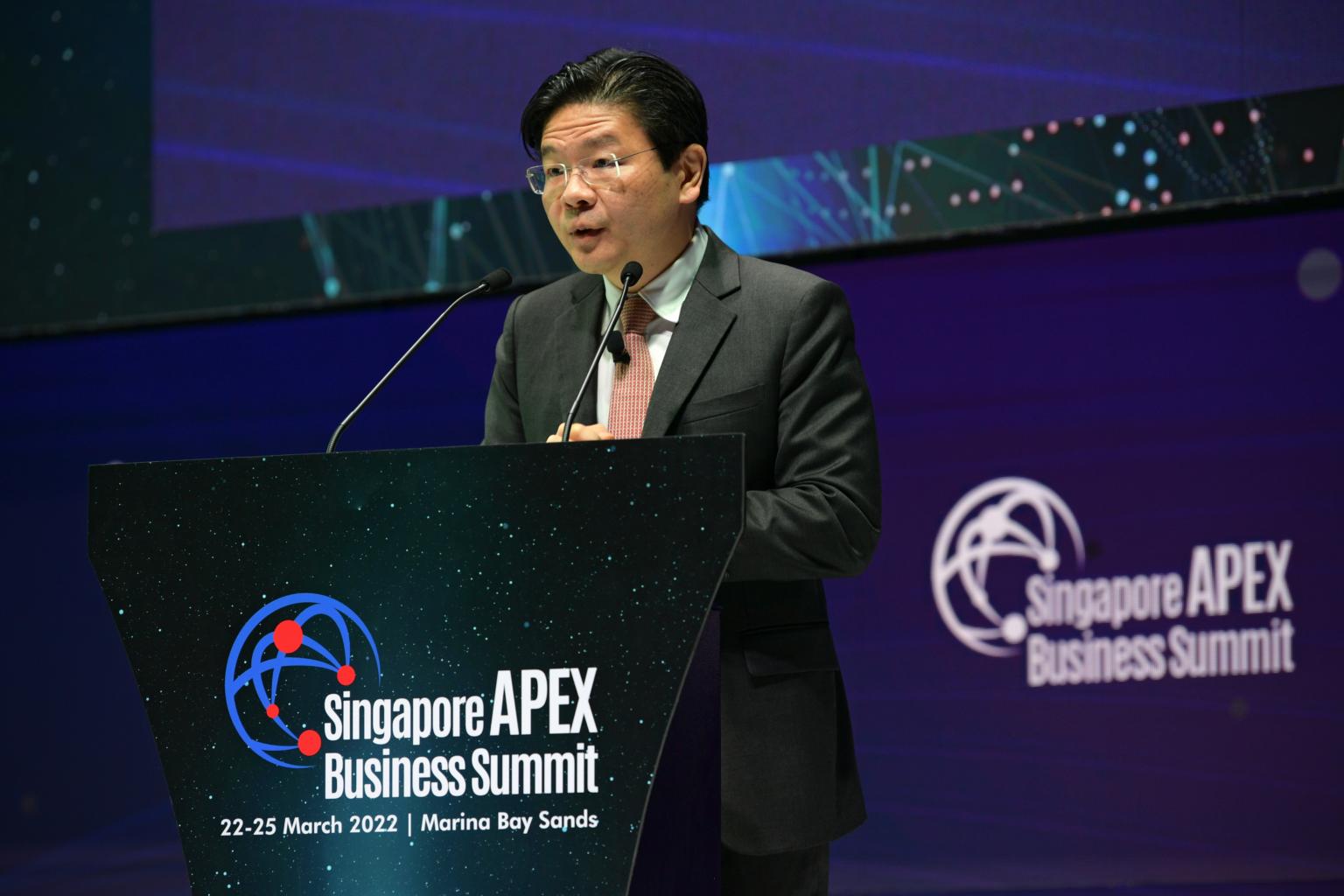Transforming to rely less on labour and energy will make Singapore firms stronger: Lawrence Wong
Sign up now: Get ST's newsletters delivered to your inbox

Finance Minister Lawrence Wong said labour and carbon constraints are likely to be a permanent fixture in the economy.
ST PHOTO: NG SOR LUAN
SINGAPORE - Making early moves to transform business processes to be less reliant on labour and be more energy-efficient will put Singapore's businesses in a stronger position for the future, said Finance Minister Lawrence Wong on Tuesday (March 22).
This is given that labour and carbon constraints are likely to be a permanent fixture in Singapore's economy in the future, he said.
Mr Wong was speaking at the Singapore Regional Business Forum (SRBF), one of the five conferences held during the Singapore Apex Business Summit at Sands Expo and Convention Centre.
The four-day summit, organised by the Singapore Business Federation (SBF) and events firm MP Singapore, ends on Friday.
The minister addressed questions posed by SBF chief executive Lam Yi Young during a lunchtime plenary, including one on whether policy measures such as foreign-workforce tightening and the carbon tax hike from 2024 could be pushed back so as not to add further to increasing cost pressures faced by companies.
Mr Wong said the Government has been cognisant of the challenges faced by businesses, and that policy changes have been deliberately staggered and announced in advance to give businesses adequate time to adjust.
While he understands the sentiments around pushing back policy changes further, he noted that the constraints around labour and carbon emissions are inevitable.
"It's wishful thinking to sort of hope that (at) some point down the road, we can do away with these constraints," Mr Wong said.
"So long as Singapore is successful as an economy, we will always have a tight labour market."
On the carbon tax front, he pointed out that if the country wants to do something about climate change and global warming, "we have to move more decisively to reduce carbon".
"So if we understand that labour and carbon will be permanent constraints in our economy, wouldn't it be better to move early to adjust, restructure and transform our business processes to rely less on labour and to be less energy-intensive?"
Mr Wong noted that many schemes and initiatives have been put in place in the Budget to help businesses with transformation on these fronts, such as sustainability measures to help firms be more energy-efficient.
He said the take-up rates for such schemes tend to end up lower than what has been budgeted for, and that it would be a "happy problem" if the take-up rate this year is much better and funds for such initiatives are fully utilised.
The minister acknowledged that businesses, especially small and medium-sized enterprises, are concerned about the "more pressing immediate issues", especially manpower and worker shortage, and the Government is mindful of their worries.
One reason firms are facing these shortages is Singapore's border measures, which have yet to be fully opened for travel, Mr Wong noted.
"But this is temporary. And with the Covid-19 situation in Singapore improving day by day... I am quite sure we will soon be able to open up for freer international travel, and when that happens, it will be much easier for firms to bring in workers, be it on work permits, S Passes or Employment Passes, or even workers across our land crossings from Malaysia," he added.
"I hope that will provide some easing on the manpower front."
Mr Wong also stressed how Singapore is putting in effort and emphasis on skills upgrading and training, as the greater churn seen in the economy is going to be a permanent feature.
"More churn means potentially more mismatches of skills," he said, adding that the Government is looking forward to working more closely with trade associations and chambers on training as well as skill-matching efforts to help firms with employee retention.
During the session, Mr Wong also addressed concerns about the uncertainties arising from Russia's invasion of Ukraine and its impact on Singapore.
He noted that aside from whether the situation could lead to a more divided world and other geopolitical implications, it is still too early to say how the crisis will impact Singapore's economy and businesses.
"If the situation were to worsen... and we see a huge impact on our economy or on inflation, we will certainly not hesitate to do more, whether through fiscal or monetary policies to make sure that we keep the economy steady, or stabilise prices and do everything we can to help households, businesses and workers."
The sixth edition of the SRBF on Tuesday included plenary sessions on topics such as sustainable supply chain management and green financing.
On Tuesday evening, the SBF held an event to celebrate its 20th anniversary, which was attended by more than 500 guests, including past and present leaders of the chamber as well as foreign dignitaries.
In her speech, President Halimah Yacob, the guest of honour, highlighted the contributions of the chamber in promoting sustainable and resilient businesses in Singapore.
She also spoke about how it has served as a key pillar of Singapore’s tripartite partnership by working with the unions and the Government to support businesses.
On Tuesday evening, the SBF held an event to celebrate its 20th anniversary, which was attended by more than 500 guests, including past and present leaders of the chamber as well as foreign dignitaries.
In her speech, President Halimah Yacob, the guest of honour, highlighted the contributions of the chamber in promoting sustainable and resilient businesses in Singapore.
She also spoke about how it has served as a key pillar of Singapore’s tripartite partnership by working with the unions and the Government to support businesses.
About a hundred business and government leaders will be speaking during the four-day summit, on topics such as digitalisation, transformation and internationalisation.


